PhD Student Spotlight: Kara Vasilew
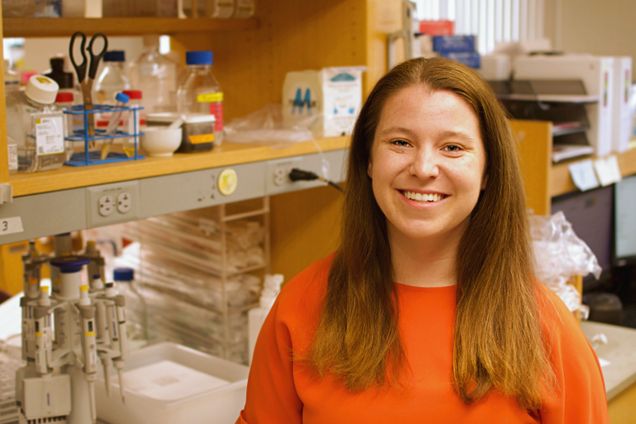
In her four years in Graduate Medical Sciences, Kara Vasilew has used both her scientific acumen to perform novel research and her voice to advocate for wide-reaching change across the Medical Campus and beyond.
Vasilew entered Boston University Chobanian & Avedisian School of Medicine in 2020 under the PhD Program in Biomedical Sciences (PiBS).
Vasilew was born in California to parents from Scotland. When it came time to attend college in 2014, Vasilew took the jump and moved east.
Vasilew earned a Bachelor of Science in Biochemistry from the Rochester Institute of Technology in 2018. She chose to attend RIT because it houses the National Technical Institute for the Deaf, the first technological college in the world for students who are deaf or hard of hearing.
Vasilew, who is hard of hearing with over 75% hearing loss in both ears, attended RIT for more support with accessibility services throughout her academic career.
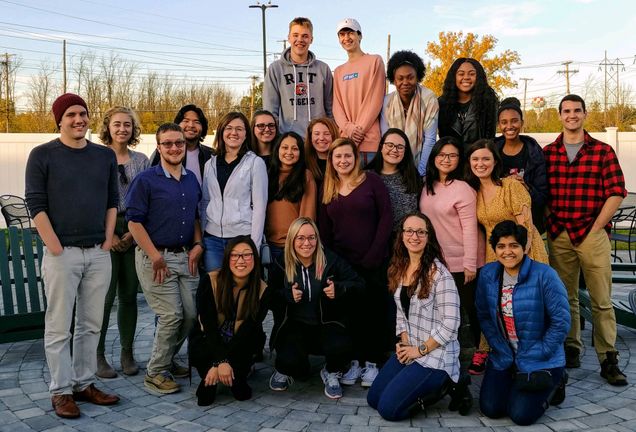
Following her graduation, she remained at RIT to complete a Master of Science in Chemistry in the lab of Lea Vacca Michel, PhD. She also completed several immunology projects at the University of Rochester.
Vasilew’s master’s research was funded by a National Institutes of Health T-32 Bridges to the Doctorate Program grant, which required her to apply to PhD programs following the completion of her degree.
“I was still on the fence about doing a PhD program, but I was just so interested in the biomedical sciences and immunology that I felt that I needed to get training in that area,” Vasilew said.
Choosing PiBS
Vasilew interviewed at four PhD programs and was accepted by each one. The BU PiBS program was the only umbrella program Vasilew considered, which was a significant factor in her decision to enroll.
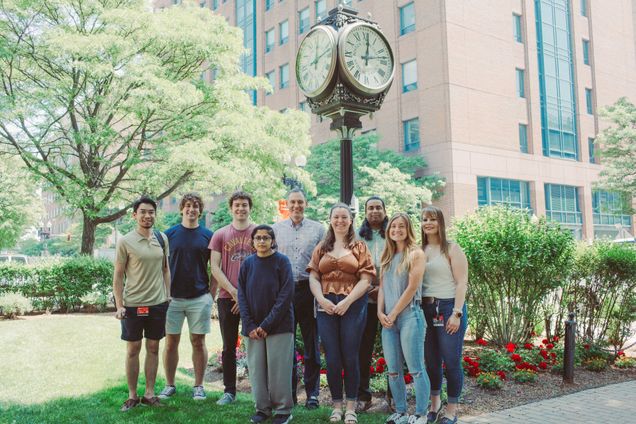
“When I interviewed here in 2020, what I really liked about [PiBS] was all of the students knew each other,” Vasilew said. “Everyone was really engaged. Everyone went to all of the events. It never felt empty at any point.”
The PiBS program offers first-year PhD students the opportunity to explore a variety of research areas over the course of three laboratory rotations, alongside a core curriculum, to help them determine their research specialization moving forward.
While Vasilew interviewed at PiBS before the onset of the COVID-19 pandemic, she matriculated into the program only a few months after initial lockdowns.
The transition to a brand-new city during the midst of COVID-19 was difficult, according to Vasilew. Strict regulations meant that Vasilew’s cohort completed their Orientation virtually, without the full-day retreat and poster sessions that are normally a staple in the PiBS Orientation schedule.
When it came time for rotations, uncertainty about ongoing lockdowns moved the normal rotation schedule up, giving Vasilew’s cohort less time to determine their rotation labs. Vasilew and her classmates used a shared document online that helped them connect easily and share experiences in different labs.
“It was a very rough transition,” Vasilew said. “But so far in my experience, I love my friends. The support that I’ve received is great. It was just the transition to get here was definitely on the rougher side. But I’m so glad I took the jump.”
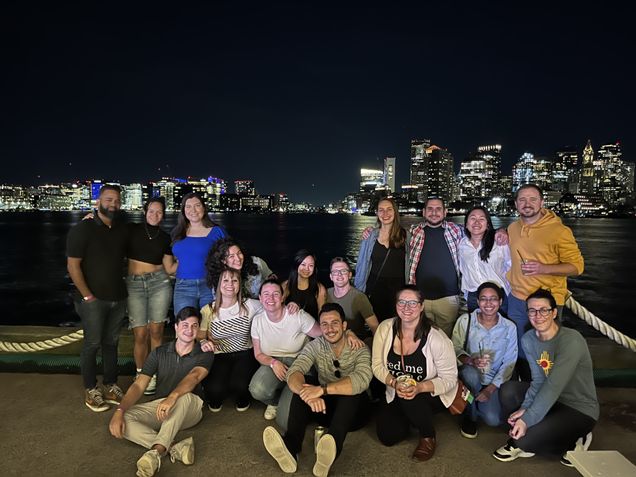
Following her first-year rotations, Vasilew specialized in the Department of Virology, Immunology & Microbiology. She is currently completing her research in the Pulmonary Center under the direction of Associate Professor of Medicine, Pathology & Laboratory Medicine Markus Bosmann, MD.
Vasilew’s research studies the effects of polyphosphates in the initial inflammatory immune response against Legionella pneumophila infection in a murine model, combining her bacteriology background with her training in immunology.
The study of polyphosphates has only gained significant traction within the last decade, according to Vasilew. Previous research from the Bosmann Lab indicated that polyphosphates promote an inflammatory response in Escherichia coli (E. coli). The goal of Vasilew’s research is to determine if polyphosphates have a similar effect on legionella and to understand the bacteria’s pathogenesis.
Stepping into Advocacy at GMS and Beyond
In her first year at PiBS, Vasilew dealt with several accessibility hindrances that were intensified by ongoing COVID-19 regulations.
One obstacle Vasilew faced regarded masking in classrooms. The clear masks available to professors fogged easily and muffled speech, making it difficult for Vasilew and notetakers to understand lecture content.
Vasilew worked alongside Assistant Dean of Master’s Programs Theresa Davies to find a mask brand that professors were comfortable using and that provided a clearer understanding of classroom content.
“When I saw C3 and I saw that they wanted [peer] mentors, I was like ‘Oh, this would be a really good way to make an impact,’”
– Kara Vasilew
Additionally, Vasilew faced challenges with remote captioning of classroom material and securing notetakers for her classes.
“I felt very alone, because it was such a struggle,” Vasilew said. “I was constantly pushing. I didn’t know if anyone else was having similar issues as me.”
That’s when Vasilew decided to get involved with the Community Catalyst Center (C3), a GMS initiative launched in August 2021 with the goal of fostering holistic success for the diverse GMS student community.
“When I saw C3 and I saw that they wanted [peer] mentors, I was like ‘Oh, this would be a really good way to make an impact,’” Vasilew said.
C3 first launched with five affinity groups designed for international students, first-generation students, students of color, LGBTQIA+ students and military- and veteran-affiliated students. Each affinity group has a dedicated resources webpage, along with a directory of student, faculty and staff mentors who offer monthly meetings to mentees.
Vasilew, who originally joined the gFIRST (first-generation student) affinity group, was instrumental in launching a sixth affinity group for students with disabilities.
Working with Davies to get the group off the ground, gDAG (Disability Advocacy Group), officially launched in August 2022. The group now has eight mentors.
“I joined C3 because I wanted to have other students know that they were not completely alone in navigating the politics and hierarchy and trying to wrap your head around all the different procedures,” Vasilew said.
Using Her Voice for Change
Vasilew also served as the medical school representative for the BU Belonging & Culture Survey working group, where she helped to develop the campus-wide survey with graduate student insights.
Following that experience, she was invited to sit on the BU Medical Campus Diversity, Equity & Inclusion Advisory Committee, launched and spearheaded by Associate Dean for Diversity & Inclusion Angelique Harris, PhD, MA.
“Angie Harris is a great advocate for accessibility,” Vasilew said. “Angie has worked in other University systems and definitely knows that within BU, there are accessibility issues, both physically and infrastructurally.”
The 15-person Advisory Committee is comprised of faculty, staff and students who provide insight from the larger medical campus about DEI-related issues that need to be addressed.
“I truly think that everyone should be on the same equal playing field, and having the representation sometimes is just enough. Having that is enough to bring in more people and make the community better, and to help shape professor and student views about what they are going to be exposed to in the real world.”
– Kara Vasilew
Vasilew is a member of the GMS-specific DEI Steering Committee, where she presents on certain accessibility issues she has faced during her time at BU and works with the committee members to find solutions to DEI-related matters within GMS.
She is also a leading member of the Women’s Professional Development Committee, which promotes women in scientific careers through a variety of speaker events and other activities.
“I’m involved in a lot, and I enjoy every second of it, even though my life is absolutely nuts” Vasilew said. “It’s fun.”
The common thread among all of Vasilew’s involvement is a drive to get people out of their “bubbles” and work to actively promote and increase diversity across campus and beyond.
“I’ve done this my whole life,” Vasilew said. “I truly think that everyone should be on the same equal playing field, and having the representation sometimes is just enough. Having that is enough to bring in more people and make the community better, and to help shape professor and student views about what they are going to be exposed to in the real world.”
The importance of representation is personal to Vasilew, who is the second deaf student to have gone through the Pulmonary Center.
“When I was an undergraduate, I was the second deaf person to join my lab,” Vasilew said. “By the time I left, there were six of us. Even having a student role model and knowing that someone went through the same thing you did is just a lot better.”
The Intersection of Science Policy and Advocacy
After 10 years at the lab bench and a lifetime in school, Vasilew is ready to take what she has learned in academia and apply it to a career in science policy and business consulting.
“I’ve been in school since I was two,” Vasilew said. “I’ve never known anything outside of school. This is all I’ve known.”
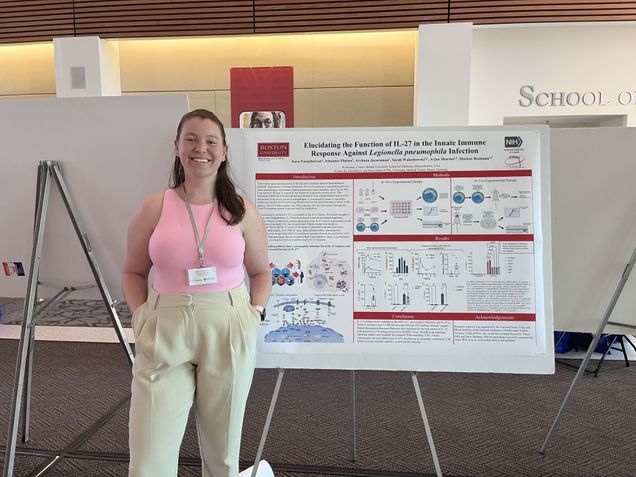
A “people person,” Vasilew’s goal is to use both her voice and her scientific expertise to advocate for others who have experienced similar obstacles in their academic and professional journeys.
Her ideal job in the future would be to work at a larger science foundation, such as the NIH or the American Association for the Advancement of Science, to push schools and higher education institutions to create a more equal playing field and promote underrepresented minorities in STEM.
“I was told when I applied for PhDs that I need to think about the disability offices at the universities which I applied to,” Vasilew said. She ultimately scrapped her first list of schools because she could not find disability and accessibility services information on their sites – another significant reason she decided to apply to BU.
“That way, future students don’t have to think about this,” Vasilew said. “That’s really kind of my passion at this point.”
Now well past the halfway point in her PhD pursuit, Vasilew is already well on her way to achieving these goals and more.
“I just have this drive that I absolutely need to prove myself and prove that I can get to this point of having a doctorate and having the willpower to do that,” Vasilew said. “That’s really pushed me all the way here, for sure.”